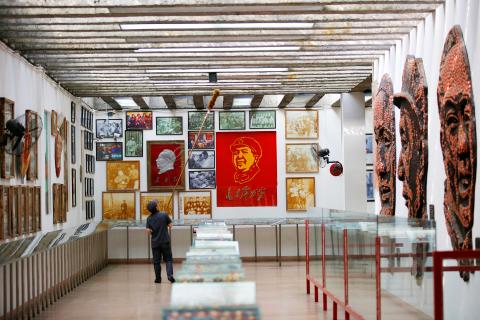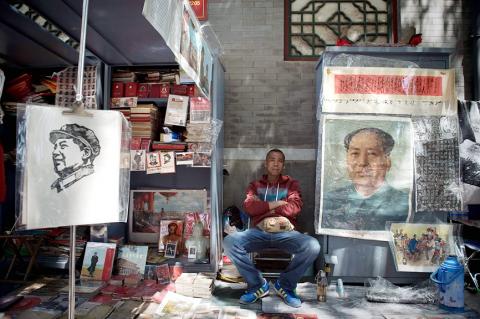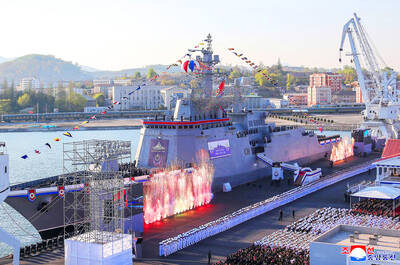At the “East is Red” shop in Shanghai, every nook and cranny is packed with memorabilia of China’s Cultural Revolution, from small badges of former Chinese Communist Party (CCP) chairman Mao Zedong (毛澤東) to gigantic posters of his iconic image.
Owner Guo Bing himself is a child of the Cultural Revolution, born in 1966, the year the chaotic and violent decade was launched on May 16.
His parents named him with the Chinese character for “soldier” (bing, 兵), a common practice at the time.

Photo: Reuters
However, Guo now sees profits rather than CCP ideals in the relics of the past, as the market booms for collectibles from a time scarred victims would prefer to forget.
“Prices have risen because of the anniversary of the Cultural Revolution,” said Guo at one of his two shops in China’s commercial hub, whose gleaming skyscrapers epitomize the country’s economic boom after the abandonment of Maoist orthodoxy.
“People suffered during the Cultural Revolution,” Guo said, before quickly adding: “We are meeting demand. There is a market.”

Photo: AFP
Guo was a “Little Red Guard” as a child in Jiangsu Province, he said, wearing his elder brother’s army uniform, pinning a Mao badge to his chest and signing patriotic songs.
One of them, The East is Red, gave him the name for his business, which has dealt in Cultural Revolution memorabilia for two decades.
For some buyers, such objects tap into nostalgia for a simpler time, when the state provided everything and society was more equal, despite the abuse the victims suffered.
“It was an exciting time for kids,” Guo said. “Most collectors now are old people, younger people lag behind.”
The objects on offer range from an enameled metal plate with the slogan “Chairman Mao’s revolutionary art and literature line victory forever” to a book of cartoons published in early 1977, soon after Mao’s death and the fall of his widow Jiang Qing (江青).
Along with the three other members of the “Gang of Four,” she was officially blamed for directing the mayhem. Once a movie actress in Shanghai, she was among a cabal of radicals with links to the city who were among the driving forces behind the Cultural Revolution.
“We can remember history,” Guo said.
On a high bookshelf in the shop, a framed picture shows Mao with a mango, which became an object of veneration after the leader gifted the fruit to a group of workers in 1968. The cult of the mango, as it is known, was even the subject of an exhibition at the Museum Rietberg in Zurich in 2013.
The reproduction sells for 50 yuan (US$8), Guo says — but an original would cost hundreds of dollars.
The disparity offers an opportunity for the unscrupulous to profit, and collectors and dealers said that rampant fakes are a problem for Cultural Revolution memorabilia, like other collecting categories in China.
On Chinese Web site Kongfz.com, an eBay-like platform for antiquarian books and other items, a search for Cultural Revolution turns up nearly 200,000 items with the most expensive an extensive collection priced at 3 million yuan.
“All along, people have appreciated Cultural Revolution objects,” long-time dealer and collector Lin Ji said.
“Where there is a market, there are fakes,” he added, citing reproductions of Red Guard armbands as an example.
Mao badges and the “Little Red Book” of his thoughts and sayings were once ubiquitous in Chinese households, but collectors hope growing scarcity will increase prices over time.
“There are too many things [from the Cultural Revolution]. But the good stuff is getting harder and harder to find,” said Guo, who has a prized Mao statue stored away at home, not for sale.
Despite the rampant consumerism — and Communist kitsch is also popular among some foreign buyers — the Cultural Revolution remains a sensitive topic, even 40 years after it ended.
The CCP fears that a full historical reckoning would undermine its legitimacy, strongly opposes a revival of leftist thought and shuns comparisons between Mao’s personality cult and the strong leadership of Chinese President Xi Jinping (習近平).
The founder of the Shanghai Propaganda Poster Art Centre, a private museum which includes several exhibits from the Cultural Revolution, declined to be interviewed in the run-up to the anniversary.
“It’s a sensitive time right now,” Yang Peiming (楊培明) said. “The museum is an art museum without any other meaning.”

Archeologists in Peru on Thursday said they found the 5,000-year-old remains of a noblewoman at the sacred city of Caral, revealing the important role played by women in the oldest center of civilization in the Americas. “What has been discovered corresponds to a woman who apparently had elevated status, an elite woman,” archeologist David Palomino said. The mummy was found in Aspero, a sacred site within the city of Caral that was a garbage dump for more than 30 years until becoming an archeological site in the 1990s. Palomino said the carefully preserved remains, dating to 3,000BC, contained skin, part of the

TRUMP EFFECT: The win capped one of the most dramatic turnarounds in Canadian political history after the Conservatives had led the Liberals by more than 20 points Canadian Prime Minister Mark Carney yesterday pledged to win US President Donald Trump’s trade war after winning Canada’s election and leading his Liberal Party to another term in power. Following a campaign dominated by Trump’s tariffs and annexation threats, Carney promised to chart “a new path forward” in a world “fundamentally changed” by a US that is newly hostile to free trade. “We are over the shock of the American betrayal, but we should never forget the lessons,” said Carney, who led the central banks of Canada and the UK before entering politics earlier this year. “We will win this trade war and

‘BODIES EVERYWHERE’: The incident occurred at a Filipino festival celebrating an anti-colonial leader, with the driver described as a ‘lone suspect’ known to police Canadian police arrested a man on Saturday after a car plowed into a street party in the western Canadian city of Vancouver, killing a number of people. Authorities said the incident happened shortly after 8pm in Vancouver’s Sunset on Fraser neighborhood as members of the Filipino community gathered to celebrate Lapu Lapu Day. The festival, which commemorates a Filipino anti-colonial leader from the 16th century, falls this year on the weekend before Canada’s election. A 30-year-old local man was arrested at the scene, Vancouver police wrote on X. The driver was a “lone suspect” known to police, a police spokesperson told journalists at the

North Korean leader Kim Jong-un has unveiled a new naval destroyer, claiming it as a significant advancement toward his goal of expanding the operational range and preemptive strike capabilities of his nuclear-armed military, state media said yesterday. North Korea’s state-run Korean Central News Agency (KCNA) said Kim attended the launching ceremony for the 5,000-tonne warship on Friday at the western port of Nampo. Kim framed the arms buildup as a response to perceived threats from the US and its allies in Asia, who have been expanding joint military exercises amid rising tensions over the North’s nuclear program. He added that the acquisition